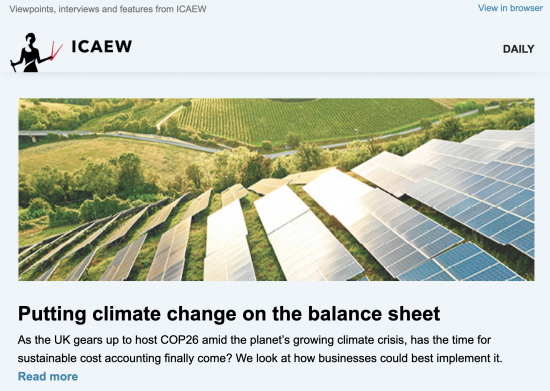Sustainable cost accounting gets top billing on the Institute of Chartered Accountants in England and Wales daily newsletter today:
As the related article notes, accountancy is now beginning to notice climate change, It adds:
There's little doubt investors need insight on such an all-encompassing issue — company accounts are therefore key to their understanding of how the corporate institutions in which they invest are responding to the challenges of climate change.
“Companies need to make visible what their profit and capital would be, given a sustainable climate. Paris-aligned accounting would be catalytic,” Natasha Landell-Mills, Head of Stewardship at global asset manager, Sarasin & Partners, told the Financial Times.
The Local Authority Pension Fund Forum, which comprises more than 80 local government pension scheme funds and controls over £250bn in combined assets, has recently endorsed such an approach following presentations from Richard Murphy, Director of the Corporate Accountability Network.
Its stance on sustainable cost accounting has also been championed by Alan MacDougal, Managing Director of the Pensions & Investment Research Consultants, Europe's largest independent corporate governance and shareholder advisory outfit, who told ICAEW Insights that “its time is now”.
Murphy, an ICAEW fellow, argues that putting the real cost of climate change on the balance sheet is now essential and must be fully embedded into the DNA of company reporting. “This means that reporting must be both mandatory and audited. That requires the disclosure to be within the financial statements and not in ESG or other reports.”
According to Murphy, it's a matter for all the stakeholders of a company, including its investors. “All of them have to know if a reporting entity can make the transition to be net zero carbon and have access to the capital that will be required to make this happen. This is a financial reporting, and so an accounting issue, and so has to be on the balance sheet.
“Accounting cannot be neutral and should, therefore, both report and encourage good practice and be a core part of that process of change,” continued Murphy.
“Ensuring that provisions for the cost of climate change be reported on the balance sheet of larger entities is all about providing them with the incentive to make the necessary investments, secure the necessary capital, and make the required changes as soon as possible.
“We do not have time to waste in delivering this,” said Murphy.
I am beginning to believe that the ICAEW really do get this, and that's encouraging.
Thanks for reading this post.
You can share this post on social media of your choice by clicking these icons:
You can subscribe to this blog's daily email here.
And if you would like to support this blog you can, here:




Great news.